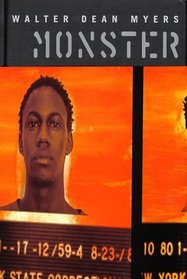Reviewed by Mechele R. Dillard for TeensReadToo.com
Sixteen-year-old Steve is on trial for murder. But he's having trouble understanding why. "What did I do? I walked into a drugstore to look for some mints, and then I walked out. What was wrong with that? I didn't kill Mr. Nesbitt"(p. 140). Nothing is wrong with that, of course--unless the purpose of that casual trip was to give the "all clear" for a robbery that ended in the murder of the store's owner. Then, something is very wrong.
By structuring the book as a movie script being written by the character as he spends his days in prison, faces his jury, prepares with his lawyer, confronts his mother and father, and, most importantly, examines his own life, Myers presents Steve as a talented young man who may have made a single poor choice. However, Myers retains conflict necessary for building a compelling storyline by having Steve refuse to acknowledge his part in Mr. Nesbitt's death. The result is that the reader wants to sympathize with the teen, but cannot help but wonder, if Steve truly does not understand why what he did was wrong, what is going to keep him from going astray in the future? Maybe, as the prosecutor stated, Steve really is a monster.
Overall, MONSTER sends an excellent message to young adults: You, and only you, are responsible for the choices you make, and the consequences for those choices may ultimately affect not only the rest of your life, but the lives of the people around you--and maybe those you do not even know. Therefore, think about what you are doing, consider the consequences of your actions, and choose wisely.
Boston Globe--Horn Book Awards, Honor Book,1999
Los Angeles Times Book Prize, Young Adult Fiction, Finalist 1999
Coretta Scott King Awards, Honor Book, 2000
Edgar Allan Poe Awards, Nominee, Best Young Adult Novel, 2000
Michael L. Printz Award, Winner, 2000
Kentucky Bluegrass Award, Grades 9-12, Winner, 2002
Sixteen-year-old Steve is on trial for murder. But he's having trouble understanding why. "What did I do? I walked into a drugstore to look for some mints, and then I walked out. What was wrong with that? I didn't kill Mr. Nesbitt"(p. 140). Nothing is wrong with that, of course--unless the purpose of that casual trip was to give the "all clear" for a robbery that ended in the murder of the store's owner. Then, something is very wrong.
By structuring the book as a movie script being written by the character as he spends his days in prison, faces his jury, prepares with his lawyer, confronts his mother and father, and, most importantly, examines his own life, Myers presents Steve as a talented young man who may have made a single poor choice. However, Myers retains conflict necessary for building a compelling storyline by having Steve refuse to acknowledge his part in Mr. Nesbitt's death. The result is that the reader wants to sympathize with the teen, but cannot help but wonder, if Steve truly does not understand why what he did was wrong, what is going to keep him from going astray in the future? Maybe, as the prosecutor stated, Steve really is a monster.
Overall, MONSTER sends an excellent message to young adults: You, and only you, are responsible for the choices you make, and the consequences for those choices may ultimately affect not only the rest of your life, but the lives of the people around you--and maybe those you do not even know. Therefore, think about what you are doing, consider the consequences of your actions, and choose wisely.
Boston Globe--Horn Book Awards, Honor Book,1999
Los Angeles Times Book Prize, Young Adult Fiction, Finalist 1999
Coretta Scott King Awards, Honor Book, 2000
Edgar Allan Poe Awards, Nominee, Best Young Adult Novel, 2000
Michael L. Printz Award, Winner, 2000
Kentucky Bluegrass Award, Grades 9-12, Winner, 2002




